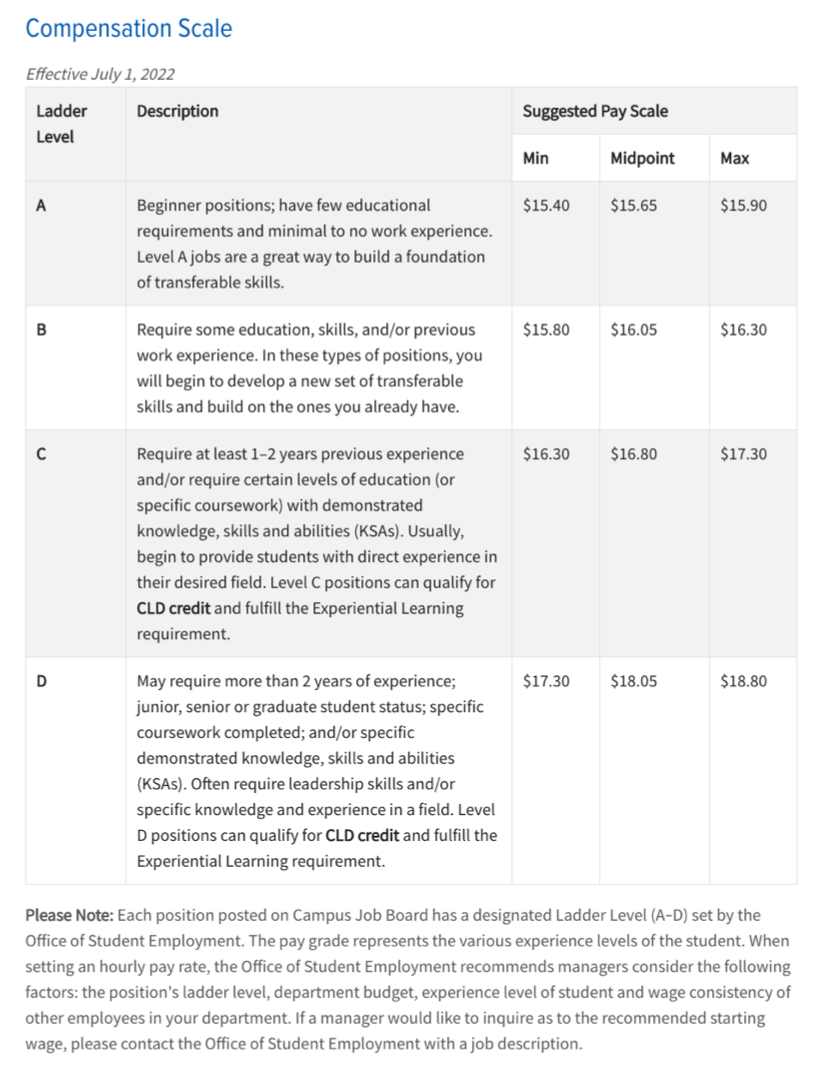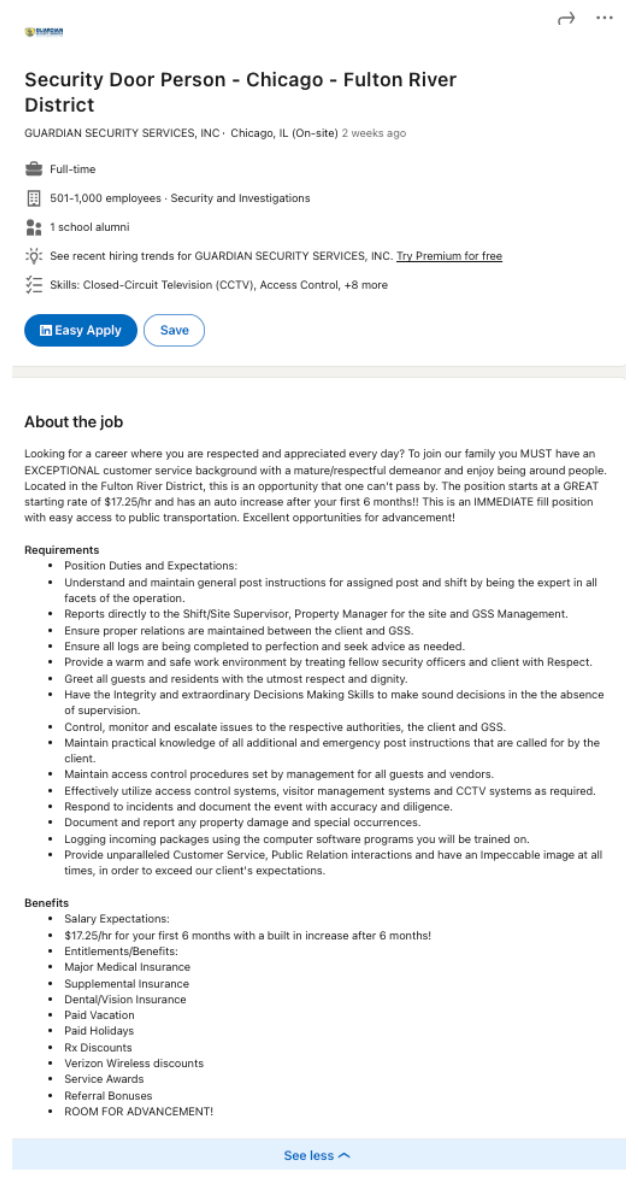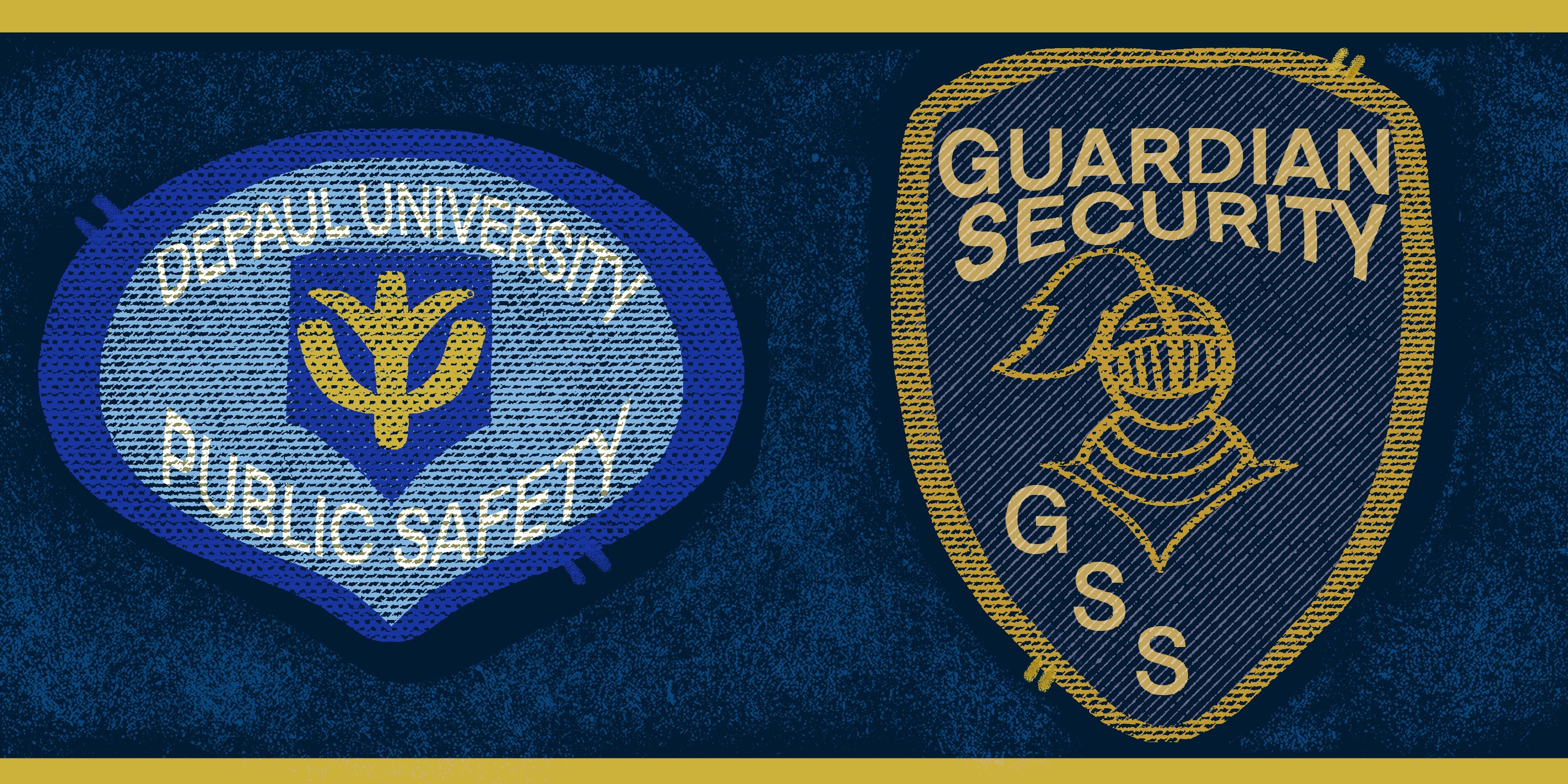Guardian’s contract on campus still stands despite history of unfair labor suits
There are two entities tasked with keeping DePaul’s campus safe and secure. Employees of one wear a light blue uniform with a “DePaul University Public Safety” patch on their sleeve. They’re known well across campus, patrolling buildings and answering for help when the DePaul community calls. Employees of the other wear a black uniform patch with “Guardian Security” on the sleeve – contracted officers hired to assist DePaul Public Safety.

The badge on a Guardian Security employee uniform. Photo by Juliana Pelaez, 14 East
Guardian Security Services is a company that staffs security personnel at contracted locations. Guardian staff can be found at residences, retail stores and universities across the Chicagoland area.
They’ve also held a contract with DePaul since the early 2000s, according to Mary Hansen of University Marketing & Communications. Specifically, in 2009, Guardian staff was contracted to assist campus security and housing.
However, Guardian’s contract with DePaul became controversial in the fall of 2017 when a one-day protest on DePaul’s campus called for “DePaul administrators to drop Guardian Security’s contract,” according to the Chicago Sun-Times. Students gathered with Guardian employees that day to protest what they considered unfair labor practices by the company. Guardian spokesperson Chet Strzelczyk, around the time of the protest, said, “Our hard-working employees recognize that they can achieve a better future for themselves without the interference of third parties who may not have our employees’ best interests in mind,” according to an article by 14 East.
Some of this scrutiny is documented. Guardian has been the subject of various cases within the Illinois Department of Human Rights (IDHR), the National Labor Relations Board (NLRB) and federal lawsuits all in the last 25 years. Though employees made contact with the Service Employees International Union (SEIU) Local 1 in September 2017, Guardian employees are not unionized.
The cases against Guardian
Two gender discrimination cases were filed with the IDHR in 2014. In one case, a female employee alleged that she was paid a lower wage than her male counterparts and terminated because a supervisor wanted a male in her position. Another unrelated case, filed that same year, alleged that a female employee was not hired due to her gender and sexual orientation. Both IDHR cases were settled, meaning both parties agreed to end the suit without going to court.
A Freedom of Information Act request was filed by 14 East for records and documentation from the two cases: Inez Coleman v. Guardian Security and LaShonda D. Adams v. Guardian Security. However, the IDPH was unable to produce those records because “files are legally destroyed pursuant to the State’s Records Act,” according to a response from IDPH FOIA officer Keisha T. Nelson.
Two years later, an NLRB case was settled after employees alleged Guardian created “unlawful work rules that effectively coerced employees from exercising their right to organize,” according to an internal document provided by SEIU Local 1.
The settlement required that Guardian was required to post and comply with a notice to employees. Guardian’s notice listed three company policies that are no longer maintained by the company: a Client Contract policy, a Fraternization and Professional Behavior policy and a Social Media Policy. While the specifics of these company policies are not publicly available, Guardian said that these policies would be rescinded from the company handbook.
“DePaul’s contract with Guardian Services includes assurance that they are an equal opportunity employer,” Hansen said. The settled cases mean that Guardian did not violate the contract with DePaul.
Prior to DePaul’s contract with Guardian, the company was reprimanded.
In 1999 NLRB found that Guardian had violated employee Steven Kissel’s employee rights by terminating him for involvement with a union. Guardian argued Kissel was “ultimately terminated solely because of his violations of uniform and equipment regulations,” according to the decisions of NLRB. Kissel had reported his equipment as broken beforehand and cited that he did not own a proper uniform, yet he was not given replacements for months. As a result, the NLRB ordered that Kissel’s role at the company be reinstated and a notice to employees informing them of their rights under Section 7 of the National Labor Relations Board Act.
According to the findings, Kissel was not reprimanded for the violations until higher ups were aware of his involvement in the union to elect new officials. Kissel continued to receive violations for his broken equipment and uniform although Guardian was aware he needed them replaced. The violations led to his termination. NLRB decided this violated some sections of the National Labor Relations Act.
In 1998, Triad Associates, also known as Guardian Security at the time, sued the Chicago Housing Authority (CHA) for reverse discrimination because of claims made that the CHA chairman Renault Robinson steered work away from them and toward two other Black-owned security firms, according to Triad Associates et. al. v. Chicago Housing Authority (1988).
The reverse discrimination suit was settled in 2000 after it had been bounced around in the legal system for 13 years, according to the Chicago Tribune in 2000.
When speaking with SEIU Local 1 Communications Director Bailey Koch, she recounted the union’s concern regarding Guardian. “We were wondering why DePaul, out of all of these institutions, were still using this non-union contractor even though it had all these things against it.”
14 East reached out to Guardian Security Services on multiple occasions, but did not receive a response.
Other Chicago-area universities also use contract security. The University of Illinois at Chicago (UIC) uses contract security, though it is not clear which company. However, UIC police and security are unionized under the Metropolitan Alliance of Police. Further north, Northwestern University has held a contract with Luna Security since July 2020, but it is not clear if Luna Security employees are unionized. Loyola University Chicago does not use contract security.
DePaul’s History with Guardian
In October 2017, Guardian employees participating in a one-day strike on DePaul’s campus cited that their pay was between $11 to $12 per hour. Strzelczy denied this at the time, saying that wages were “significantly higher” than $11 per hour.
Other complaints had to do with the long work hours and alleged harassment by the company, according to the Chicago Sun Times.
Students and union representatives called for DePaul to release details of their contract with Guardian, which both parties declined to do. Today, that contract still stands.
At the time of the protest, Guardian employees were staffed for the overnight shift at residence halls. Today, they’re staffed at residence hall desks and academic buildings. They are set to respond quickly and efficiently to emergencies. Their pay range, according to Linkedin job advertisements from the company, is equal to slightly higher than what DePaul’s student employees make.

Pay ranges suggested by DePaul University for Student Employees according to DePaul’s Office of Student Employment website.

A Linkedin job posting by Guardian Security Services.
With advertised hourly wages listed at $16 to $19 per hour for Guardian employees, annual salaries for full-time employees range between $33,280 and $39,520 a year. DePaul’s Office of Student Employment shows that an average student job can pay between $15.40 and $17.40 per hour.
Where Guardian stands
According to a Guardian security guard who works at DePaul, they receive paychecks and their initial training from Guardian Security. However, all additional training and instruction comes from DePaul itself. This security guard requested to stay anonymous to protect their job.
The Guardian security guard also mentioned their training. As a new hire, they told 14 East, they were given four hours of training for their specific location before taking a test. After the test, they were put on duty, but could get additional training by request.
According to the DePaul’s Public Safety website, “Public Safety officers have completed the state-approved training as provided by Section 28 of the Illinois Private Security Act of 1993 and Section 24-2(6) of the Illinois Criminal Code.” DePaul Public Safety officers, including Guardian employees working at DePaul, are unarmed.
Although Guardian security staff on campus do receive the remainder of their training from DePaul, most of their training comes from the company. On the Guardian Security Services website every employee goes through training. In this set training course, Guardian creates “a comfortable environment and utilizes multiple training methods to encourage individual development and the retention of training material.”
Why does Guardian remain nonunionized?
Even after outreach from SEIU Local 1 in 2017, Guardian still remains nonunionized. Communications Director Bailey Koch said the union has not kept contact with Guardian employees in the past couple of years.
“It takes a lot of courage. Like, you’re risking your job at a time where you can’t lose your job,” Koch said. “It’s hard for you to want to raise your voice and talk about what’s needed in the changes.”
Despite a history of allegations against Guardian, DePaul says they will stay uninvolved. Hansen wrote,“In general, DePaul does not intervene in labor issues between contracted vendors and their employees.”
Header illustration by MJ White




NO COMMENT